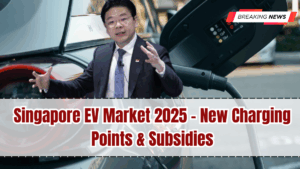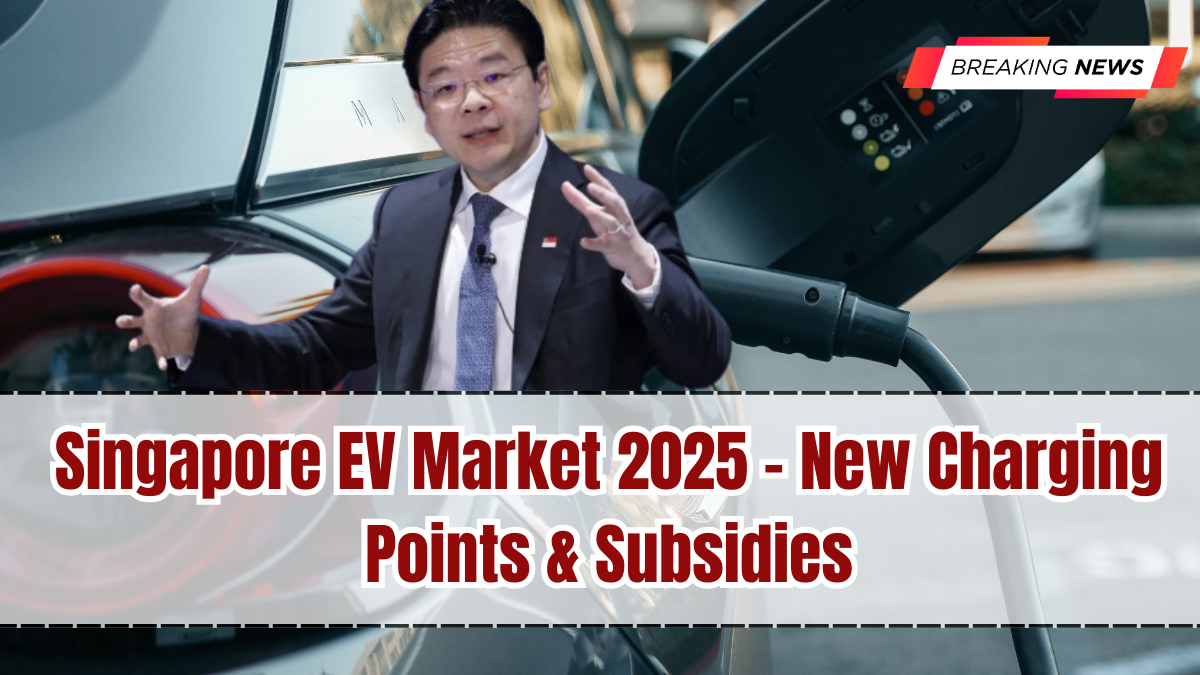The Singapore EV Market 2025 is witnessing rapid growth as the government pushes ahead with its electrification plans. With more charging stations, better incentives, and increasing consumer interest, electric vehicles (EVs) are no longer seen as a niche option—they are moving into the mainstream.
In September 2025, new policies and infrastructure updates were announced, further boosting confidence among both buyers and manufacturers. Singapore’s roadmap toward cleaner, greener transport is starting to take visible shape.

EV Adoption in Singapore
Electric vehicle adoption in Singapore has grown steadily over the last few years. In 2020, EVs represented less than 1% of all car registrations. By 2025, this figure has climbed significantly, driven by government incentives and a growing variety of models available on the market.
The entry of global brands like Tesla, BYD, Hyundai, and Polestar has widened consumer choice. At the same time, local buyers are now more conscious of fuel savings and environmental impact, making EVs an attractive long-term option.
New Charging Stations in 2025
A key highlight of 2025 is the expansion of the charging infrastructure. The government announced the addition of 3,000 new charging points across residential areas, commercial buildings, and public carparks.
-
HDB Estates: Many new chargers have been installed in Housing Board carparks, ensuring residents have convenient access.
-
Shopping Malls: Major malls like VivoCity, ION Orchard, and Jewel Changi Airport have expanded fast-charging facilities.
-
Expressways: Selected petrol stations along expressways now include ultra-fast DC chargers, reducing charging times significantly.
This expansion is part of Singapore’s goal to have 60,000 charging points by 2030. The September 2025 update marks a strong step toward meeting that target.
Government Subsidies and Incentives
The government has continued its EV Early Adoption Incentive (EEAI) in 2025, which provides rebates of up to S$20,000 for eligible models. In addition:
-
Reduced Road Tax: EVs enjoy lower road tax compared to traditional petrol cars.
-
Lower ARF (Additional Registration Fee): Discounts are applied for electric cars to make them more competitive.
-
Grants for Commercial EVs: Logistics and transport companies get support to switch fleets from diesel to electric.
Together, these subsidies make EVs far more appealing to cost-conscious buyers.
Impact on Car Buyers
For car buyers, the Singapore EV Market 2025 presents new opportunities. With fuel prices rising, switching to an EV offers substantial savings over time.
Buyers now have access to affordable models such as the BYD Dolphin 2025, alongside premium options like the Tesla Model 3 and BMW iX. With charging becoming more convenient, range anxiety—a common concern—is steadily fading away.
Impact on the Auto Industry
Car dealerships are adapting quickly. More showrooms are promoting electric models, and test drives for EVs have doubled compared to 2024.
Finance companies have also rolled out green auto loans, offering lower interest rates for EV buyers. This adds another financial benefit for switching to electric.
Used EVs are also entering the market, creating a more diverse range of price options. Analysts believe that by 2027, EVs could account for more than 30% of all new car registrations in Singapore.
Challenges That Remain
Despite the progress, challenges still exist.
-
Upfront Costs: Even with subsidies, EVs remain more expensive than petrol cars in some categories.
-
Charging Demand: While infrastructure is expanding, peak-hour demand at popular charging stations can cause waiting times.
-
Battery Recycling: Proper systems for battery disposal and recycling are still being developed.
The government is working closely with private companies to address these issues, ensuring that the transition is smooth.
Long-Term Outlook
Singapore’s long-term strategy is clear: a complete phase-out of internal combustion engine (ICE) vehicles by 2040. The progress seen in 2025 is proof that the roadmap is on track.
As more manufacturers bring in affordable EVs and the charging grid becomes denser, the market will only grow. The September 2025 updates reinforce Singapore’s position as a regional leader in EV adoption.
Conclusion
The Singapore EV Market 2025 stands at a turning point. With thousands of new charging points, strong government support, and growing consumer interest, electric vehicles are quickly becoming part of daily life.
While some hurdles remain, the momentum is undeniable. For car buyers, businesses, and policymakers alike, the electric revolution is no longer a future dream—it is happening right now in Singapore.
FAQs
How many new charging stations were added in 2025?
Around 3,000 new charging points were introduced in residential, commercial, and expressway locations in 2025.
What subsidies are available for EV buyers in Singapore?
Buyers can receive up to S$20,000 in rebates under the EV Early Adoption Incentive, along with lower road tax and reduced registration fees.
Which are the most popular EV models in Singapore in 2025?
Models like the Tesla Model 3, BYD Dolphin, Hyundai Kona Electric, and BMW iX are among the most in-demand choices.
Is charging an EV convenient in Singapore now?
Yes. With new charging points in HDB estates, malls, and expressways, charging has become much more accessible compared to earlier years.
What is Singapore’s EV target by 2030?
Singapore aims to have 60,000 charging points nationwide and significantly higher EV adoption by 2030.
Click here to know more.
